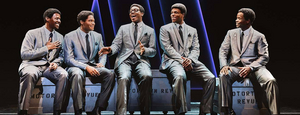Review: AIN'T TOO PROUD at Benedum Center Rocks the House
The national tour takes the stage at the Benedum Center.
 After watching the show and reading the credits, it's impossible to deny that Ain't Too Proud is just Jersey Boys with significantly better songs but slightly less plot. Still, only a cynic of the darkest degree would say "Jersey Boys but better" doesn't sound like a great night at the theatre. Director Des McAnuff and choreographer Sergio Trujillo pull out most of the familiar tricks and bits of staging from their earlier superhit, but the songs they get as a framework here are undeniably better across the board than the Four Seasons songbook's relative highs and lows.
After watching the show and reading the credits, it's impossible to deny that Ain't Too Proud is just Jersey Boys with significantly better songs but slightly less plot. Still, only a cynic of the darkest degree would say "Jersey Boys but better" doesn't sound like a great night at the theatre. Director Des McAnuff and choreographer Sergio Trujillo pull out most of the familiar tricks and bits of staging from their earlier superhit, but the songs they get as a framework here are undeniably better across the board than the Four Seasons songbook's relative highs and lows.
The book, by playwright Dominique Morriseau, paints the story as a showbiz tragicomedy centering around sole survivor Otis Williams (Marcus Paul James), who looks back on his over half a century in music at the group he founded, Motown's legendary Temptations. Unlike Jersey Boys, which focused on the core Four Seasons, the main focus here is on how the music changed, and the world around them changed, while Otis remained the only constant. Along the way, he formed friendships and rivalries with Motown mastermind Berry Gordy (Michael Andreaus), and butted heads with Temptations turned solo artists David Ruffin (Elijah Ahmad Lewis) Eddie Kendricks (Jalen Harris).
The core original Temptations are all fantastic. Marcus Paul James's Otis may be the founder but he was never the star of the Temptations, and as such James doesn't get a big vocal solo until the end. Despite this, his ongoing narration and Everyman status gives a grounding to the show's perspective that the perspective-shifting sister show Jersey Boys never acquires, as well as justifying the conceit that the Temps as a group and a concept were bigger than merely the sum of its original parts. Elijah Ahmad Lewis shines in the showier role of David Ruffin, the showboating frontman whose personal life and substance abuse interfere with group cohesion. Lewis sings and dances like an absolute master of his craft, lending the darker moments of the character unexpected heft; it really does feel like seeing a glimpse behind the perfectly curated media image. Harrell Holmes Jr.'s Melvin Franklin, the superbass of the group, often plays the role of gentle giant, but Holmes's floor-rattling basso profundo gives heft to Melvin's gradual illness and decline in old age.
The supporting cast is strong, particularly Michael Andreaus as Berry Gordy. Gordy isn't a singing role for the most part, but he serves as a dramatic foil to the Temptations as a whole. The Motown head was an exacting taskmaster, but his dominance and masterful ear drove the group to evolve and excel. Attention must be paid as well to Lawrence Dandridge, whose cameo as Smokey Robinson nearly stopped the show when he spoke in a dead-on caricature of Robinson's high, airy voice.
By the end of the show, most of the male ensemble have played former Temptations or replacement Temptations... and then comes the finale, in which the whole cast appear in matching suits as a giant super-Temptations ensemble. The curtain opens, revealing the orchestra playing and dancing (including some apparent extras holding instruments that they clearly are not playing and do not appear in the orchestration at all). Yes, it's the same ending as Jersey Boys, but the party atmosphere is so palpable, and the music so good, that complaining seems to miss the point. The sense of community fostered by the Temptations over the last sixty years, between band members and audience alike, turns the entire Benedum into party central.
A side note as we leave: one of my favorite things about Pittsburgh theatregoing culture is that there's a certain tiny demographic (mostly older, suprisingly) who have taken to cosplay or "bounding" (dressing in the style of but not explicitly AS characters) when they go to the theatre for a big musical. We had Pink Ladies at Grease, a few Julia Robertses at Pretty Woman, and two men in full Gouster era post-zoot suits at Ain't Too Proud. I smiled and complimented, they gave me a nod; this sort of playful audience engagement is to me the surest sign that post-lockdown, the Pittsburgh theatre scene is alive and well once more.
Reader Reviews
Videos

